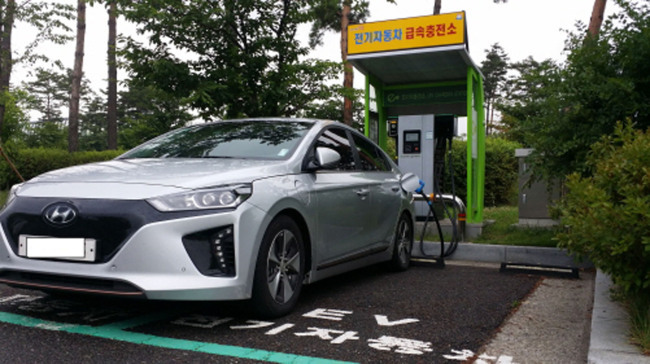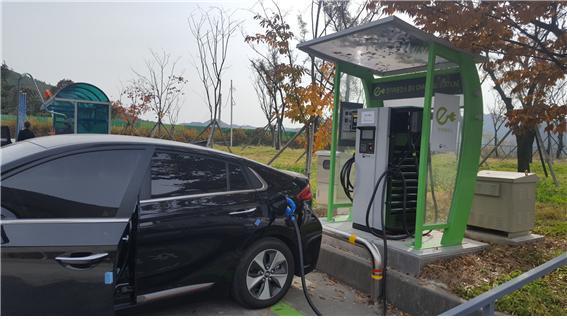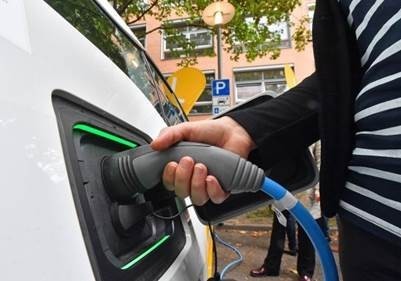Korea’s most populous province to turn EV-friendly
By Son Ji-hyoungPublished : March 14, 2017 - 13:50
Gyeonggi Province, Korea’s most populous province, rolled out a plan Monday to support buyers of electric vehicles.
Starting from June 13, those who purchase EVs in the province will receive a subsidy on a first-come-first-served basis. There will also be a requirement for construction in the region to feature parking lots that have EV battery charging stations
Starting from June 13, those who purchase EVs in the province will receive a subsidy on a first-come-first-served basis. There will also be a requirement for construction in the region to feature parking lots that have EV battery charging stations

The first 664 buyers of EVs this year will be granted 19 million won ($16,500). An additional 2 million won will be given to those who replace a diesel car registered before 2006 with an EV.
Newly built parking lots that can accommodate 100 to 299 vehicles are required to have at least one EV charging station, while those with the capacity to hold 300 to 499 vehicles should have at least two stations. Three stations should be installed in parking lots that can accommodate more than 500 cars.
In addition, those driving EVs in the province will be exempt from toll fees on three designated expressways and parking fees in public parking places.
Newly built parking lots that can accommodate 100 to 299 vehicles are required to have at least one EV charging station, while those with the capacity to hold 300 to 499 vehicles should have at least two stations. Three stations should be installed in parking lots that can accommodate more than 500 cars.
In addition, those driving EVs in the province will be exempt from toll fees on three designated expressways and parking fees in public parking places.

As part of a move to improve air quality that has worsened over the years, the province aims to take in 50,000 EVs by 2020, accounting for about 1 percent of the entire vehicles there, according to its plan released in December 2016. The number of EVs in the province rose from 122 at the end of 2014 to 448 in October 2016.
Other provinces in South Korea re also promoting the use of EVs. Jeju Island -- where 2,200 EVs were registered last year -- aims to supply 7,000 EVs this year, with the help of subsidies from the state and local governments. The local governments of Seoul, Daegu and North Jeolla Province also announced plans to support EV buyers last year.
Other provinces in South Korea re also promoting the use of EVs. Jeju Island -- where 2,200 EVs were registered last year -- aims to supply 7,000 EVs this year, with the help of subsidies from the state and local governments. The local governments of Seoul, Daegu and North Jeolla Province also announced plans to support EV buyers last year.

In December 2016, the central government said it would set aside 264.2 billion won to support local administrations in installing charging stations and to encourage diesel car owners to buy EVs.
In June 2016, it unveiled a plan to inject 3 trillion won to support EVs in Korea, which accounts for more than half of the budget earmarked for battling fine dust in the nation.
By Son Ji-hyoung (consnow@heraldcorp.com)
In June 2016, it unveiled a plan to inject 3 trillion won to support EVs in Korea, which accounts for more than half of the budget earmarked for battling fine dust in the nation.
By Son Ji-hyoung (consnow@heraldcorp.com)








![[Graphic News] More Koreans say they plan long-distance trips this year](http://res.heraldm.com/phpwas/restmb_idxmake.php?idx=644&simg=/content/image/2024/04/17/20240417050828_0.gif&u=)
![[KH Explains] Hyundai's full hybrid edge to pay off amid slow transition to pure EVs](http://res.heraldm.com/phpwas/restmb_idxmake.php?idx=644&simg=/content/image/2024/04/18/20240418050645_0.jpg&u=20240419100350)






![[From the Scene] Monks, Buddhists hail return of remains of Buddhas](http://res.heraldm.com/phpwas/restmb_idxmake.php?idx=652&simg=/content/image/2024/04/19/20240419050617_0.jpg&u=20240419175937)

![[KH Explains] Hyundai's full hybrid edge to pay off amid slow transition to pure EVs](http://res.heraldm.com/phpwas/restmb_idxmake.php?idx=652&simg=/content/image/2024/04/18/20240418050645_0.jpg&u=20240419100350)

![[Today’s K-pop] Illit drops debut single remix](http://res.heraldm.com/phpwas/restmb_idxmake.php?idx=642&simg=/content/image/2024/04/19/20240419050612_0.jpg&u=)